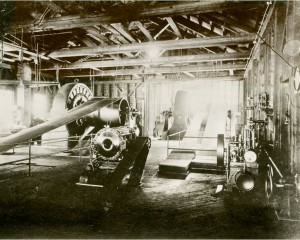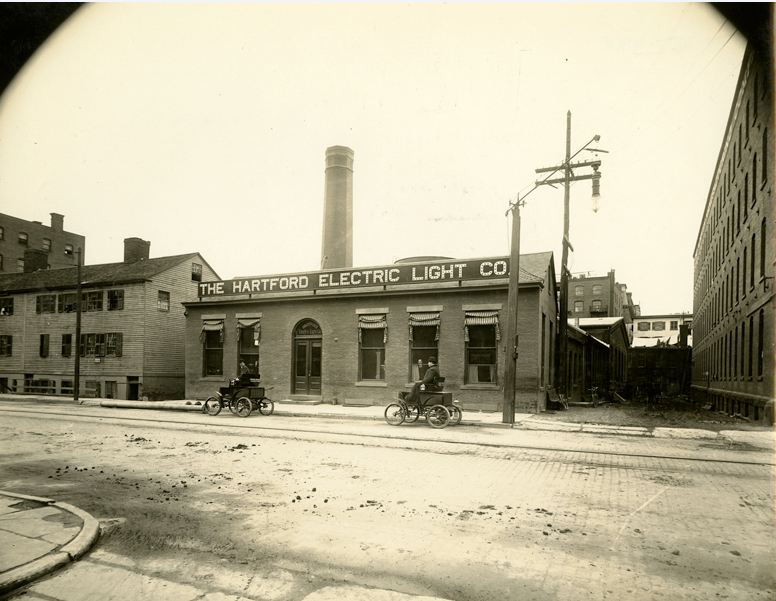By Zac Mirecki for Your Public Media
In 1881, over 1,000 gaslights lit 80 miles of streets in Hartford. The Hartford Electric Light Company began operations with a steam-powered electrical generating plant on Pearl Street on April 7, 1883, serving 6 customers with 21 arc lamps. By the end of September 1888, a HELCO arc lamp had replaced the city’s last gas streetlight.
Growth of the company was rapid and increased customer usage demanded a new means of producing power. Edward Clinton Terry (grandson of Eli Terry) founded the Farmington River Power Company in 1890 to supply HELCO electricity. The company’s laboratory became the Oil City Generating Station, constructed on the Farmington River in the Rainbow section of Windsor Locks. By 1893, the 11 mile, 3-phase transmission line to Hartford was heralded as the first long distance transmission of electricity.

Interior of the Oil City plant. Photograph taken before the fire of Sept. 6, 1897 destroyed the wooden structure. Note the 300 hp and 500 hp water turbines installed by the Farmington River Power Company in 1890 – Connecticut Historical Society
When the company’s 266 Pearl Street offices were photographed in 1902, the building was the hub of a system that produced 3,650 horsepower to operate 77,000 incandescent lights and 1,034 arc lights. The company had as its many assets Oil City, a second hydro plant at Tariffville (1899), and the steam plant at Pearl Street, which now housed the first steam turbine (a 55-ton Westinghouse unit named “Mary-Ann”) to be produced in America and installed in a public utility station. The electrical inspector for the Hartford Board of Fire Underwriters noted at this time that Hartford was “far in the lead of any other city in the world in the use of electricity for light and power per capita.” In two decades, HELCO had thrust Hartford to the forefront of the electrical age.
Zac Mirecki, who processes archival collections for the Connecticut Historical Society on a volunteer basis, is studying at Simmons Graduate School of Library and Information Science West in South Hadley, Massachusetts.
© Connecticut Public Broadcasting Network and Connecticut Historical Society. All rights reserved. This article originally appeared on Your Public Media.
Note: ConnecticutHistory.org does not edit content originally published on another platform and therefore does not update any instances of outdated content or language.









